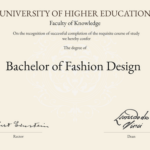Unveiling the Bachelor of Industrial Design (B. ID) Degree
Introduction
The Bachelor of Industrial Design (B. ID) is an undergraduate program that melds creativity with technical acumen to create products that are both aesthetically pleasing and functionally superior. Industrial designers influence everything from the simplest household items to sophisticated technological devices, making their role pivotal in shaping our daily experiences. This degree provides students with the skills to innovate, design, and improve products, ensuring they meet the needs and preferences of users.
Core Areas of Study
A B. ID degree typically encompasses a variety of subjects, such as:
- Design Fundamentals: Basics of design principles, including color theory, form, and composition.
- Materials and Manufacturing: Understanding the properties of different materials and the manufacturing processes used in product design.
- 3D Modeling and CAD: Training in computer-aided design (CAD) and 3D modeling software to create detailed and precise product designs.
- Human Factors and Ergonomics: Studying how products interact with users to enhance comfort, safety, and efficiency.
- Sustainable Design: Focusing on environmentally friendly materials and sustainable production methods.
- Prototyping and Testing: Creating prototypes and conducting tests to refine designs based on user feedback and performance criteria.
Skills Developed
Students in a B. ID program acquire a broad spectrum of valuable skills, including:
- Creativity and Innovation: Developing original and inventive design solutions.
- Technical Proficiency: Mastering design software and tools essential for modern industrial design.
- Problem-Solving: Identifying design challenges and devising effective solutions.
- User-Centered Design: Prioritizing the needs and experiences of end-users in the design process.
- Collaboration: Working effectively within multidisciplinary teams to bring products from concept to market.
- Project Management: Managing design projects through all stages, from initial concept to final product delivery.
Career Opportunities
A B. ID degree opens the door to various career paths across multiple industries. Some potential career options include:
- Product Designer: Creating and developing new products for industries such as consumer electronics, furniture, automotive, and more.
- Industrial Designer: Focusing on the overall aesthetics and functionality of mass-produced items.
- UX/UI Designer: Designing user interfaces and user experiences for digital products and applications.
- Design Consultant: Offering design expertise and advice to businesses and organizations.
- Packaging Designer: Creating packaging solutions that are functional, attractive, and sustainable.
- Sustainable Designer: Specializing in eco-friendly and sustainable design practices.
Top Universities for B. ID
Several institutions worldwide are renowned for their exceptional industrial design programs. Some of the top universities include:
- Rhode Island School of Design (RISD) (USA): Known for its rigorous and interdisciplinary design education.
- Royal College of Art (RCA) (UK): Offers a highly regarded program emphasizing innovation and creativity.
- ArtCenter College of Design (USA): Focuses on practical skills and strong industry connections.
- Delft University of Technology (Netherlands): Integrates engineering and design for comprehensive education.
- University of Technology Sydney (UTS) (Australia): Combines cutting-edge design theory with practical experience.
Conclusion
A Bachelor of Industrial Design degree is an excellent choice for those passionate about creating innovative, functional, and aesthetically pleasing products. The program equips students with a robust foundation in design principles, technical skills, and practical knowledge, preparing them for a wide range of exciting and rewarding careers. As industries continue to evolve and place greater emphasis on user-centered design and sustainability, the demand for skilled industrial designers is set to grow, making this an opportune time to pursue a B. ID degree


